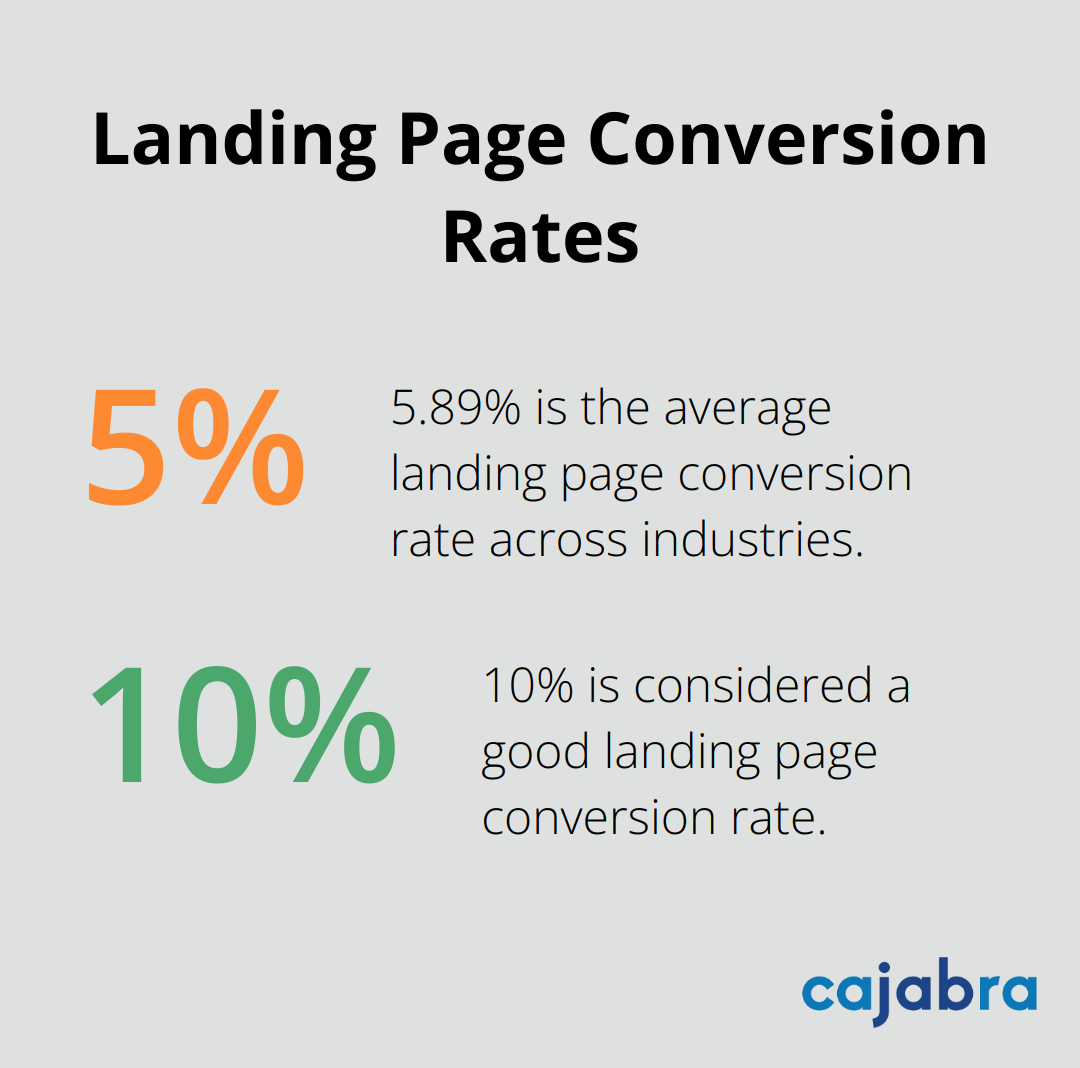
At Cajabra, LLC, we know that measuring content marketing success is vital for any business strategy.
Content marketing KPIs provide the data you need to evaluate your efforts and make informed decisions.
This post will guide you through the essential metrics, help you set up a measurement framework, and show you how to analyze your results effectively.
Content marketing success depends on tracking the right Key Performance Indicators (KPIs). Four critical areas provide a comprehensive view of your content's performance.
Website traffic forms the foundation of content marketing. It's not just about quantity, but quality too. Google Analytics helps track:
Nearly 91% of the global search market is owned by Google. 68% of online experiences start with a search engine, emphasizing the importance of organic traffic. Focus on increasing your organic search traffic month-over-month to indicate improved SEO and content relevance.

Engagement metrics reveal how your audience interacts with your content. Key metrics include:
Content Marketing Institute reports that 72% of marketers use engagement metrics to measure content performance. Try to achieve an average time on page of at least 3 minutes for long-form content, indicating that visitors find your material valuable.
Content should drive business results. Track conversion rates for:
HubSpot reports that companies with 30+ landing pages generate 7 times more leads than those with fewer than 10. Create dedicated landing pages for each content offer to maximize conversions.
Social media extends your content's reach and fosters community engagement. Monitor:
Sprout Social's data shows that 89% of consumers will buy from a brand they follow on social media. Share valuable content consistently to build a loyal following and drive traffic back to your site.
These KPIs will give you a clear picture of your content marketing performance. It's not about tracking every possible metric, but identifying those that align with your specific business goals (and regularly analyzing them to guide your content strategy).
Now that we've covered the essential KPIs, let's explore how to set up a robust content marketing measurement framework to put these metrics into action.
Start your framework by setting specific, measurable content marketing goals. Do you want to increase brand awareness, generate leads, or boost sales? For example, set a goal to increase organic traffic by 25% over the next quarter or generate 100 new leads per month through content downloads.
Select KPIs that align directly with your goals. If lead generation is your focus, prioritize metrics like conversion rates on landing pages and form submissions. For brand awareness, track metrics such as social media reach and mentions.
According to Content Marketing Institute, creating the right content for the audience has become less challenging for B2B marketers, with only 40% citing it as a challenge this year compared to 57% last year. Focus on KPIs that truly indicate progress towards your business objectives.
Set baseline performance metrics and realistic targets. For newcomers, industry averages provide a useful reference point. HubSpot reports that the average landing page conversion rate across all industries is 5.89%, with 10% considered a good conversion rate. Use this as a starting benchmark, then improve based on your specific circumstances.

Invest in reliable analytics tools to track your chosen KPIs. Google Analytics is essential for website metrics, while SEMrush or Ahrefs provide valuable SEO insights. Social media platforms offer native analytics, but consider Sprout Social for more comprehensive social media tracking.
For email marketing, platforms like Mailchimp or Constant Contact offer detailed engagement metrics. If you focus on lead generation, a CRM system like HubSpot or Salesforce helps track leads through your sales funnel.
Consolidate your key metrics into a single dashboard for easy monitoring. Tools like Google Data Studio or Databox allow you to create custom dashboards pulling data from multiple sources. This provides a holistic view of your content performance at a glance.
Set up a schedule for reviewing your content marketing metrics. Weekly check-ins help you stay on top of short-term trends, while monthly or quarterly reviews allow for more strategic analysis and planning.
During these reviews, look for patterns and correlations between different metrics. You might notice that blog posts on a particular topic consistently drive higher engagement and conversions (use these insights to refine your content strategy).
Your measurement framework should remain flexible. As your content marketing strategy evolves, prepare to adjust your KPIs and targets. What worked last year might not be as effective now, so stay agile and responsive to changes in your audience's behavior and preferences.
With a solid measurement framework in place, you'll demonstrate the ROI of your content and make data-driven decisions to improve your strategy. Now, let's explore how to analyze and interpret these content marketing KPIs effectively.
Start your analysis by looking for patterns in your KPI data over time. If you notice that blog posts about tax planning consistently outperform other topics in engagement and conversions, this indicates a high-interest area for your audience. You should create more in-depth content on this topic, such as an eBook or webinar series.
Use Google Analytics to identify pages with the highest exit rates. A high exit rate might signal that the content doesn't meet user expectations or lacks a clear next step. Improve these pages by adding relevant internal links, clearer calls-to-action, or more comprehensive information.
Different marketing channels often yield varying results. Analyze your KPIs across channels to determine where to focus your efforts. If your LinkedIn posts drive more qualified traffic to your website than Facebook, allocate more resources to LinkedIn content creation and promotion.
89% of B2B marketers use organic social media platforms to distribute content. If you don't see strong results on these platforms, reassess your strategy or seek expert guidance.

Use your KPI analysis to inform strategic decisions. If your long-form content consistently generates more leads than short blog posts, shift your content mix to include more comprehensive guides or whitepapers.
Pay attention to engagement metrics like time on page and bounce rate. Poor performance in these metrics for certain content types might indicate a mismatch between your content and your audience's needs. Survey your audience or conduct interviews to better understand their pain points and information needs.
When presenting your KPI analysis to stakeholders, focus on insights that can drive action. Instead of simply reporting that organic traffic increased by 20%, explain which specific content pieces or SEO tactics contributed to this growth and how you plan to replicate this success.
Use data visualization tools to make your reports more digestible. A clear, visually appealing dashboard can help stakeholders quickly grasp key trends and make informed decisions. Tools like Google Data Studio or Tableau can help create impactful visual reports.
The goal of KPI analysis isn't just to measure performance, but to continuously improve your content marketing strategy. Regular reviews of your KPIs and acting on the insights they provide will enable you to create more effective, targeted content that resonates with your audience and drives business results.
Measuring content marketing success through KPIs empowers businesses to maximize their digital presence and drive results. We explored key metrics across website traffic, engagement, conversions, and social media that provide a comprehensive view of content performance. A robust measurement framework yields valuable insights to refine your strategy and achieve your marketing goals.
The true power of content marketing KPIs lies in using insights to improve your approach continuously. You should analyze your data, identify trends, and adapt your content strategy accordingly. This process allows you to create more targeted, effective content that resonates with your audience and drives business growth.
Cajabra offers specialized marketing services for accounting firms looking to elevate their content marketing game and attract more high-value clients. Our expertise can help you implement effective Content Marketing KPI tracking and analysis, ensuring your content marketing efforts deliver measurable results. Start implementing these strategies today, and watch your content marketing efforts reach new heights.



